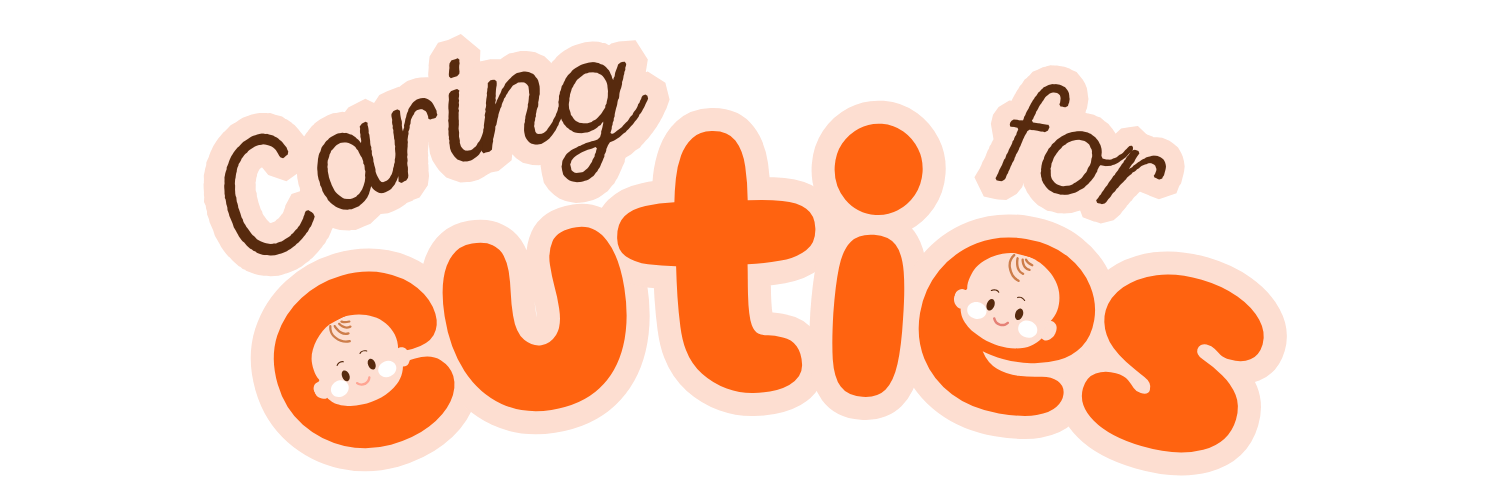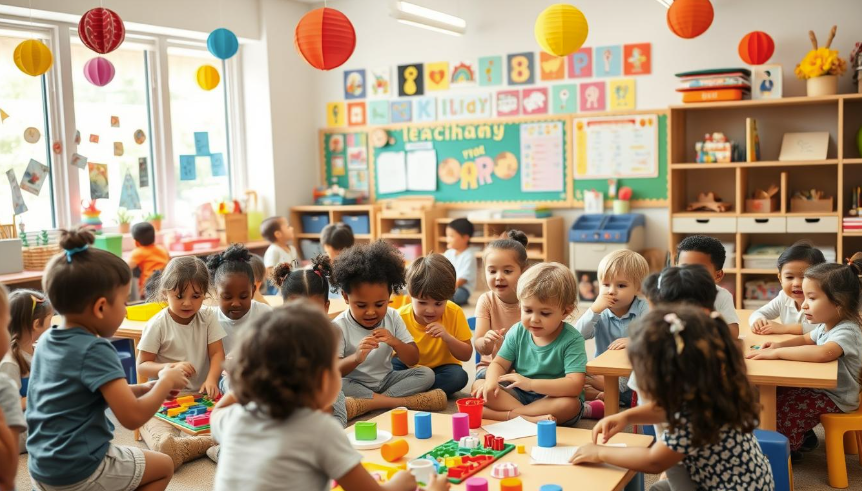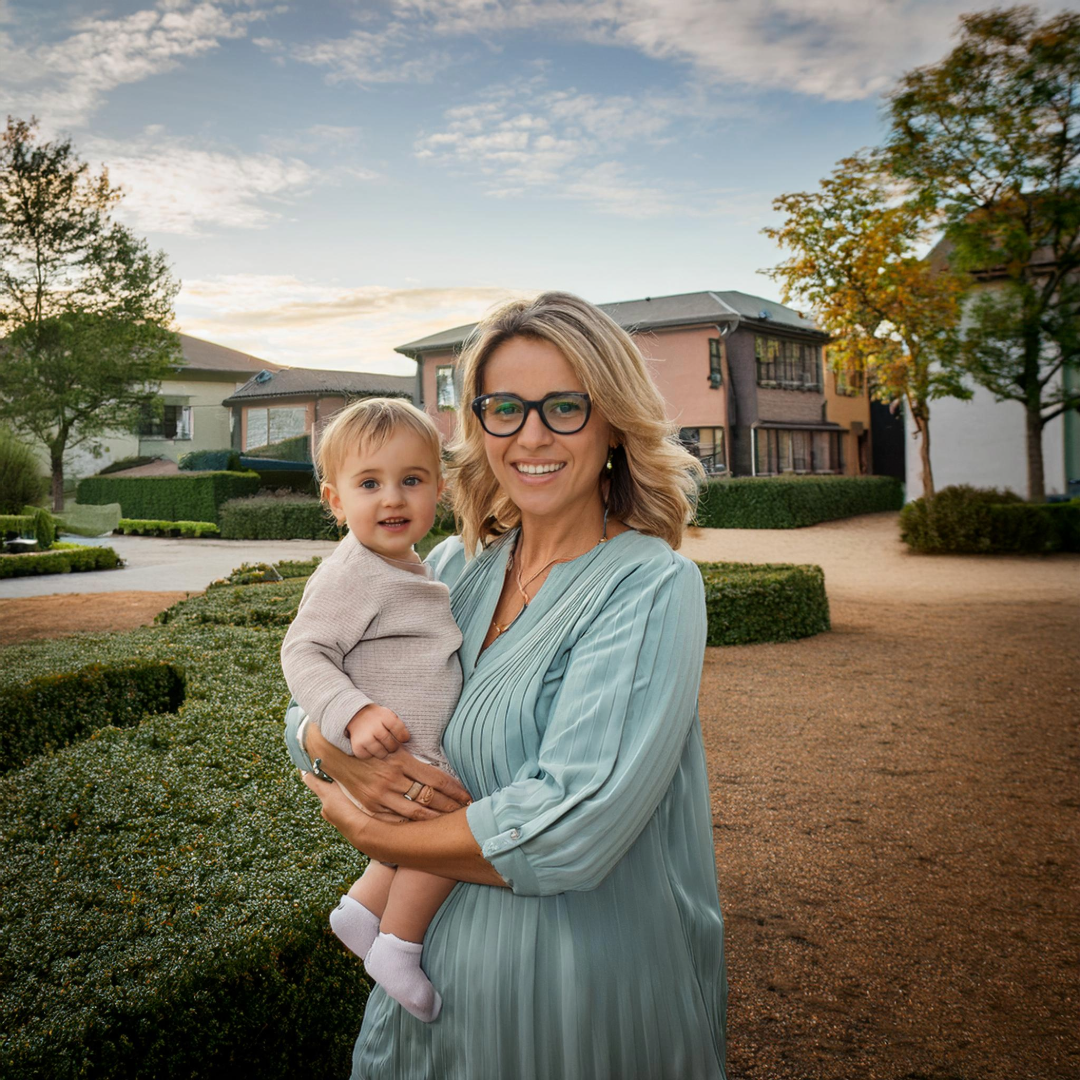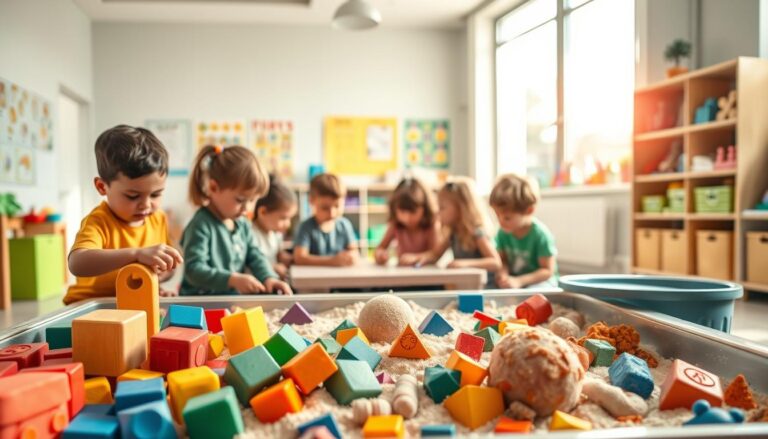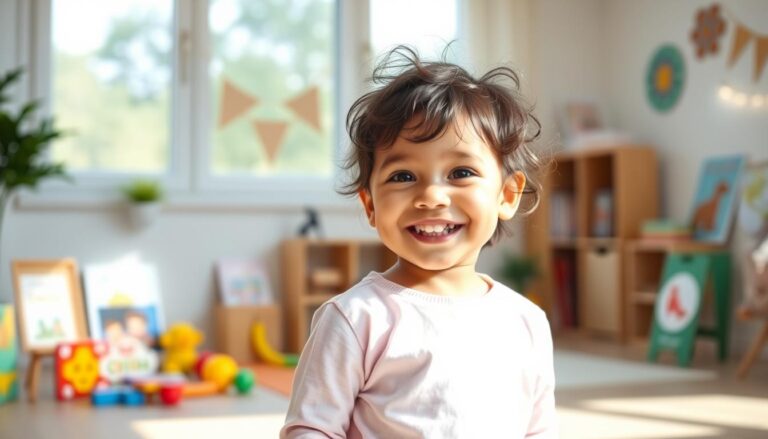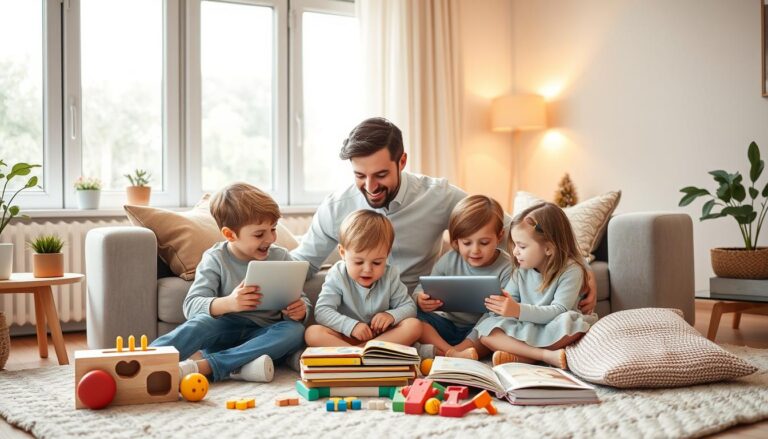As parents, we are key in helping our kids grow socially and emotionally during preschool, particularly in developing preschoolers’ social skills. Skills like empathy, talking well, and solving problems are vital. They help kids do well in school and build strong relationships later on. This guide will help you teach these important skills to your preschooler, preparing them for a happy and healthy life.

Key Takeaways
- Preschoolers’ social skills development is vital for their success in school and life.
- Parents can help kids learn important skills like empathy, communication, and self-control.
- Playing together and making a supportive home environment are key to helping kids grow socially.
- Building strong friendships and relationships with peers in preschool is important for the future.
- Adding social-emotional learning to daily routines can greatly benefit a child’s well-being.
Understanding the Importance of Social Skills Development in Early Childhood
Preschool is key for learning social skills. These skills are essential for a child’s growth and success. Young children learn to interact with others, communicate, and manage their feelings. This foundation is important for their future in school and social life.
Key Developmental Milestones in Social Growth
In preschool, kids hit big social milestones. They learn to share, take turns, and work together. They also start to understand and share their feelings and those of others. These skills help them make friends and do well in class.
The Role of Social Skills in Academic Success
Many studies show that social skills are linked to doing well in school. Kids who are good at talking, solving problems, and controlling their feelings do better in school. These skills help them stay focused, listen to teachers, and work well with others.
Long-term Benefits of Early Social Development
The good things about social skills start early and last a long time. Kids who learn to get along well with others grow up to be more empathetic and emotionally smart. They also tend to be happier and do better in life.
It’s very important to help preschoolers develop their social skills. By doing so, parents and teachers help kids grow, succeed in school, and make good friends. This sets them up for a happy and fulfilling life.
Essential Preschoolers Social Skills for Success
Young children need to learn important social skills for school and life. They must learn to communicate, share, take turns, and work together. These skills help them do well in school and in life.
Communication is key for preschoolers. They need to share their thoughts and feelings and listen to others. Role-playing, storytelling, and group talks help them practice.
Sharing is also important. It helps kids play together and understand others. They can share toys and ideas through games and projects.
- Sharing activities include building blocks together and playing with shared toys.
- It’s important to show kids the value of sharing and solve any sharing problems.
Taking turns is another important skill. Kids who wait patiently and follow rules are better at playing with others. This skill helps them make friends and work together.
| Social Skill | Importance | Examples of Activities |
|---|---|---|
| Communication | Enables effective expression of thoughts, feelings, and needs | Role-playing, storytelling, group discussions |
| Sharing | Promotes cooperative play and empathy development | Cooperative block building, turn-taking games, collaborative projects |
| Turn-taking | Fosters patience, rule-following, and compromise | Board games, interactive music and movement activities |
| Cooperation | Supports teamwork and problem-solving skills | Group art projects, cooperative outdoor games, group clean-up activities |
Cooperation is also vital. It helps kids work together and solve problems. Group projects and games teach them to cooperate.

By teaching these skills, parents and teachers help kids grow into confident, well-adjusted people. These skills are key for success in school and life.
Building Emotional Intelligence and Self-Regulation
It’s key to help preschoolers grow their emotional smarts and self-control. By teaching them to spot and share their feelings, we lay a solid base for emotional balance. This helps them manage frustration and disappointment better.
Teaching Emotion Recognition and Expression
At this age, kids start to grasp and share their emotions. We can introduce them to many feelings using pictures and fun games. This way, they learn to understand their own and others’ feelings.
Encouraging them to share feelings through art or music helps too. It boosts their ability to talk about emotions.
Developing Self-Control Strategies
Young kids are learning to control their impulses and feelings. We can teach them to calm down with deep breathing or mindfulness. These skills help them succeed in school and with friends.
Managing Frustration and Disappointment
It’s normal for preschoolers to feel upset or let down. We can teach them ways to deal with these feelings. A supportive space and role-playing can help them handle tough emotions.
By focusing on emotional smarts and self-control, we prepare kids for a bright future. These skills are vital for good relationships, emotional strength, and happiness.
Fostering Effective Communication Skills
It’s vital for kids to have strong preschool communication skills. These skills help them do well in school and make friends. By learning to listen well and understand body language, kids start strong in talking and connecting with others.
Enhancing Active Listening Skills
Active listening is key to good communication. Parents and teachers can help kids listen better. They can do this by making them focus on the speaker, ask questions, and repeat what they heard.
Mastering Nonverbal Communication
Nonverbal communication is also important. It helps kids show feelings and understand others. Teaching them about body language and tone of voice helps them get along better with others.
Fostering Effective Dialogue
Teaching kids to talk in turns is great for their communication skills. It helps them think better and solve problems. This skill is important for learning and making friends.
| Communication Skill | Description | Benefit |
|---|---|---|
| Active Listening | Focusing on the speaker, asking relevant questions, and summarizing key points | Improved understanding, stronger relationships, and better conflict resolution |
| Nonverbal Communication | Recognizing and interpreting body language, facial expressions, and tone of voice | Enhanced social awareness, empathy, and emotional intelligence |
| Effective Dialogue | Taking turns sharing thoughts and ideas, engaging in back-and-forth conversation | Cognitive development, problem-solving skills, and stronger interpersonal connections |
By teaching these skills, we help kids do well in school and make friends. They learn to talk and connect with others in a meaningful way.

“Effective communication is the foundation of early childhood development and learning.”
Teaching Empathy and Kindness Through Daily Activities
Teaching preschoolers to be empathetic and kind is key for their growth. Simple activities in their daily lives can help. Parents and teachers can instill these qualities that benefit them for life.
Role-Playing Exercises for Empathy Development
Role-playing helps kids understand others’ feelings and views. Ask them to act out scenarios where they see things from another’s perspective. This could be a sad classmate or a frustrated sibling. It’s a way to practice empathy in a safe space.
Incorporating Books and Stories About Kindness
Reading books that show kindness can inspire empathy in kids. Teaching empathy to preschoolers and encouraging empathy in young children is easier with the right stories. These stories teach positive behaviors and the value of helping others.
Creating Opportunities for Helping Others
Give preschoolers chances to help others. This can teach them empathy and community spirit. Simple actions like donating to charity or making cards for the elderly show them the joy of helping.
“Empathy is the ability to understand and share the feelings of another.”
Building Strong Friendship Skills and Peer Relationships
Helping children develop preschool friendship skills and positive preschool peer relationships is key. It’s important for their social and emotional growth. Parents can help a lot by encouraging positive relationships in preschool and building social competence in their kids.
Teaching preschoolers to share is a big part of building friendship skills. Encourage them to take turns with toys, share snacks, and play together. This helps them understand others and builds strong friendships.
Cooperation is also vital for preschoolers. Activities and problem-solving help them learn teamwork. This creates a sense of community and belonging in preschool.
- Facilitate turn-taking games and activities to promote sharing and cooperation.
- Encourage children to work together on art projects, building blocks, or other collaborative tasks.
- Roleplay scenarios where children practice resolving conflicts through negotiation and compromise.
Teaching preschoolers how to solve conflicts is also important. Teach them to express feelings, listen, and find solutions. This skill helps them deal with social challenges and prepares them for future relationships.
| Skill | Description | Benefit |
|---|---|---|
| Sharing | Taking turns with toys, sharing snacks, and engaging in collaborative play | Develops empathy and consideration for others, lays the foundation for successful peer interactions |
| Cooperation | Working together in group activities and problem-solving exercises | Fosters a sense of community and belonging, teaches the value of teamwork |
| Conflict Resolution | Expressing feelings, listening to others, and finding mutually agreeable solutions | Helps navigate social challenges and sets the stage for success in future relationships |
By focusing on these preschool friendship skills and preschool peer relationships, parents can encourage positive relationships in preschool and build social competence in their children. This sets them up for a lifetime of meaningful connections and social success.
Interactive Games and Activities for Social Development
Playing interactive games is a fun way for preschoolers to learn social skills. These games help them learn to work together, take turns, and interact through music and movement. This way, parents and teachers can help them grow strong in social skills.
Group Play Activities That Promote Cooperation
Cooperative games teach preschoolers about teamwork and shared goals. For example, “parachute games” and “scavenger hunts” require kids to work together. These activities improve communication, problem-solving, and teamwork.
Turn-Taking Games and Learning Patience
Learning patience and taking turns are key for preschoolers. Games like “Simon Says” and “Red Light, Green Light” teach kids to wait and follow rules. Board games and card games also help them practice patience and turn-taking. These games help them understand social norms and self-regulation.
Social Skills Through Music and Movement
Music and movement make learning social skills fun for preschoolers. Simple songs and dances that involve hand-holding or group coordination help build community. They improve communication and encourage social interaction. This way, kids can learn motor skills, emotional expression, and how to interact with others.
Interactive games and activities that promote teamwork, patience, and social interaction through music and movement are great. They help preschoolers develop essential social skills. This prepares them for strong relationships and navigating the social world.
Creating a Supportive Learning Environment at Home
Teaching social skills to preschoolers isn’t just for school. A supportive home environment is key. Parents can help by doing home activities for social skills that match what their child learns at preschool. This makes learning smooth and consistent.
When parents get involved in teaching social skills, kids do better. They learn to recognize emotions, control themselves, and talk well. Activities like family talks, role-playing, and team projects help build a strong foundation for social skills.
It’s also important to talk with the child’s preschool teachers. Working together, home and school can make sure kids get a full education. This helps kids feel confident and ready for social situations.
FAQ
What is an example of a social skill for a preschooler?
Preschoolers can show social skills like taking turns and sharing toys. They also follow instructions and greet others. Plus, they enjoy playing together.
What social skills do preschool children have?
Preschoolers can communicate their needs and express feelings. They show empathy and follow rules. They also play well with others.
What is normal social development for a 4 year old?
At 4, kids love playing with friends. They share and take turns. They also understand social cues and rules.
Why are social skills important for preschoolers?
Social skills are key for preschoolers. They help with learning, making friends, and feeling good. Good social skills help kids succeed in school and life.
